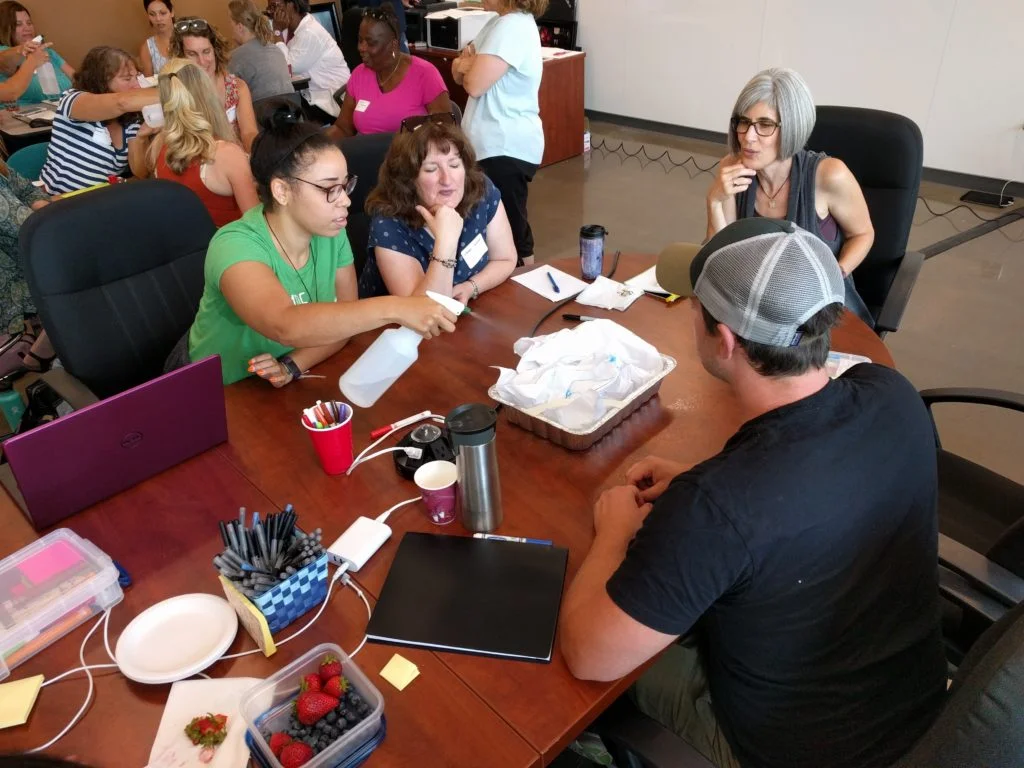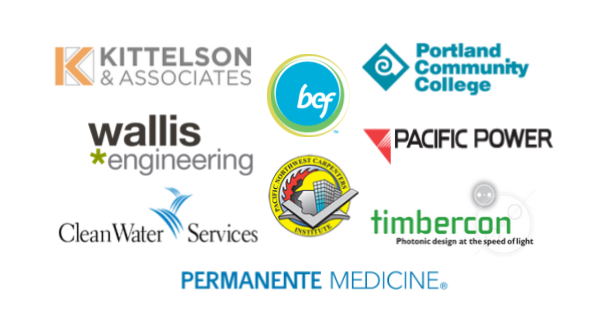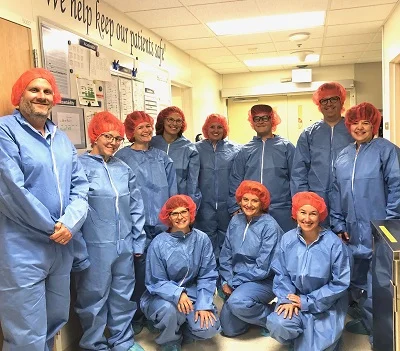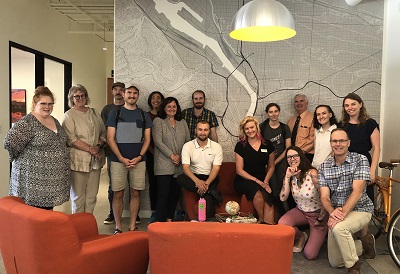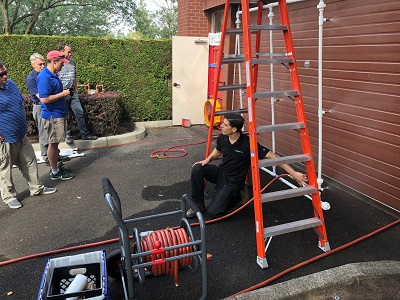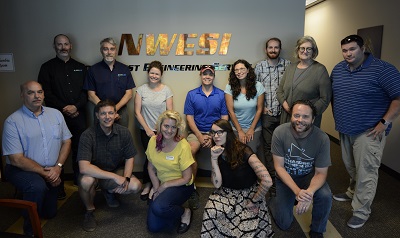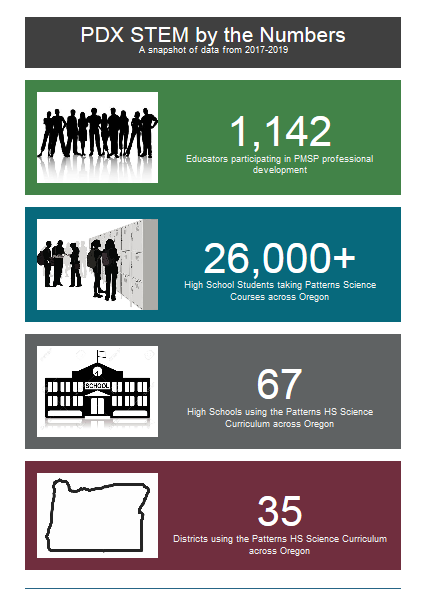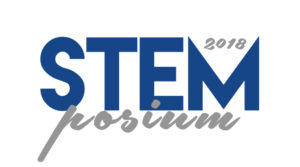PMSP’s 3rd annual Summer Teacher Externship Program has just successfully concluded. Educators from Portland, Hillsboro, Beaverton, Gresham, and beyond gathered for virtual tours, discussions, and collaboration with local industry representatives from TimberCon Inc., Clean Water Services, Portland Community College, Wallis Engineering, PLLC, Kittelson & Associates, Inc., Pacific Northwest Carpenters Institute, Bonneville Environmental Foundation, Kaiser Permanente and Pacific Power.
September 2019 All Partner Meeting
Many thanks to Vernier Software & Technology for hosting our September “Back to School” All Partner Gathering! We had 52 participants from 32 organizations representing K-12 schools and districts, out of school program providers, community colleges and universities, and business and industry attend this fun gathering where we explored two important topics:
1) Measuring What Matters
Portland Metro STEM is participating in 40-hours of graduate-level professional learning with eight other STEM Hubs across Oregon. Working with Project Impact, our regional team conducted interviews of 30 educators and community partners on the impacts our Professional Development had on their self-efficacy and ability to impact students for the good. During this meeting, we shared highlights from three out of our seven findings:
Seeing is Believing: Individuals -- whether they are students, educators or business people -- need to see real-life examples of whatever they are seeking to understand or work towards. Educators need to see STE(A)M education in action, including “master teachers” and exemplary programs.
STE(A)M is Equity: Educators and partners recognize and value the role of STEM learning as a powerful equity strategy and not simply as content areas or an instructional approach. Having a shared belief allows partners to leverage STEM as a critical and effective strategy for addressing educational inequities and transforming the lives of marginalized students.
Real Learning Leads to Powerful Change: The strategic integration of knowledge, tools, and resources in educator professional development made it possible for educators and administrators to take steps more quickly and effectively towards the change they want to see in their practice and community.
The full report is available here.
2) Kids Can’t be What They Can’t See
Portland Metro STEM brings together partners to better support our educators in providing opportunities for kids to see what they can be. Part of these efforts includes providing opportunities for educators to participate in Industry Externships. These externships provide educators with the opportunity to connect classroom content to real-world contexts so that students can see the high wage/high demand jobs in our region and see that they have a place in those fields. Research shows that students learn about careers from five primary sources.
Parents
Neighbor or parents of friends
Distant relative
Counselors
Teachers
Externships at STEM industries help teachers gain first-hand knowledge of how companies use STEM and hire for the future workforce. For examples of past externships, please see this blog post.
Many thanks to our 2019 Industry partners!
Teacher Externships Bring Real-World Experience Into Classrooms
Preparing students for the future workforce is a tremendous responsibility being placed upon our teachers. In order to connect classroom content to real-world context, educators need to experience and understand how professional skills and STEM knowledge are used in our region’s job sectors. Externships at STEM industries help teachers gain first-hand knowledge of how companies practice engineering design and hire for the future workforce.
Portland Metro STEM Partnership recently completed its second annual Summer Teacher Externship Program. Over fifty teachers from the Portland Metro Region visited eight local STEM-related companies representing high-wage/high-demand fields. The visits gave teachers a glimpse into the expectations, culture, and opportunities available to our region’s students.
Clean Water Services
Clean Water Services (CWS), a Water Resources Management Utility in Washington County introduced teachers to all aspects of waste and stormwater management. Our introductory talk with Human Resources set the stage for the lab, treatment plant, and Tualatin River Farm tours. Learning about the chemical, biological, an ecological underpinnings of CWS’ processes inspired teachers to make connections to their classrooms: “There are so many things that connect to my biology class! At the [Tualatin River] Farm, there were connections to many ecological concepts--especially succession.”
The Clean Water Services site tours were fascinating. At the CWS’s lab, water is tested from the treatment plant, surrounding businesses, and the Tualatin River. Chemistry teachers discovered that the tests being conducted (fecal chloroform, nitrogen levels, and ammonia) reflected the work done in their classrooms. One teacher excitedly commented: “We do this experiment!” Lab employees emphasized that this kind of work requires attention to detail, creativity, and the ability to work independently, which incited many high fives around the room.
““Seeing that my classes do some of the lab tests that are performed here will help my students see themselves as having those same skills. ”
At the Tualatin River Farm, our group learned that CWS was the first agency in the United States to be given a federal permit that allows them to accumulate temperature credits through vegetative plantings. While standing around large beds of plant starts at their farm, employees described a planting program that works from the ground up to enhance shade on the river and tributaries. This project began nearly twenty years ago and has evolved over time. For example, CWS is now looking at plants that do well further south as climate change will put different demands on cooling the river.
A treatment plant tour unfolded the process of capturing and reusing methane and producing fertilizer as a use of byproducts (available at your local Fred Meyer!). Knowing how to solve problems and stick with challenging situations were noted as critical skills by our tour guide; who commented, “Every day is a different challenge and figuring out how to use what we have to solve it is the best part of my job…”
Your Poop brought to YOU!
Special thanks to Elysia O’Connor of Clean Water Services for coordinating our 2019 teacher externship.
Davis Tool, Inc.
Davis Tool, Inc. is the largest custom manufacturing and assembling company in the Pacific Northwest. Teachers toured the machining floor and discovered that the job of a manufacturing employee requires significant math skills, independent thinking, the ability to read complex instructions unique to each project, and clear communication. There are jobs for all levels of education at Davis Tool and they specifically pull entry-level employees from Portland Community College’s Machining Program. Davis Tool is looking for employees who have hands-on experience and not just theoretical knowledge. One educator remarked that while his freshman physics curriculum has a lot of hands-on work, he would like to find ways to enhance that and incorporate more team communication.
Special thanks to Michael Stokes of Davis Tool, Inc. for coordinating our 2019 teacher externship.
Intel Corporation
Teachers approached the Intel externship with some knowledge of one of the largest employers in Oregon however most had never been inside their facilities. Part of the experience was gaining an understanding of what it’s like to be an employee at such a large company. Employees at Intel have access to onsite gyms, health clinics, coffee shops, game centers, and garden seating for cafeteria or food cart meals. Intel also has a large investment in equity and diversity. Numerous employees made time to have conversations with teachers; they represented a wide array of backgrounds and most were members of Affinity groups that provide support to specific underrepresented populations within the Intel organization.
A unique experience at Intel involved employees acting as mentors to small groups of teachers. Six employees sat at various spots in the meeting room and pairs of teachers visited each employee for a few minutes before moving onto another Intel expert. Teachers enjoyed the opportunity to ask specific questions that related to their own subject matter as well as their student demographics. Time flew by as group after groups rotated through the room.
Another surprise at Intel was the lab tour. Teachers expected to walk into a bright, white room with immaculate work stations. Instead the group found a lab that looked like a cross between an industrial garage and a computer rebuilding center. Every workstation was well-organized, but the mess of hands-on creativity along with the use of tools such as a soldering iron changed many teacher’s perceptions of lab work at Intel. Employees were moving from area to area to do work. Each was trying to work through a challenge.
Special thanks to Donna Maleki of Intel for coordinating our 2019 externship.
Oregon Health & Sciences University
The externship visit to Oregon Health & Sciences University (OHSU) was immensely popular. Teachers were excited to get a glimpse into the work that OHSU does in treating the most complex health needs in the region. While the group spoke with medical professionals with advanced degrees, our teachers were also given a unique glimpse into professions that can allow young people with other forms of post-secondary education to begin working in the field of medicine. OHSU has developed “Career Ladders” which, along with tuition reimbursement and flexible schedules, can offer a supported path to advancement.
The OHSU externship provided tours of two different departments to demonstrate how the hospital’s Career Ladders work. The Sterile Processing Lab prepares all materials for procedures and surgeries. Wearing hairnets, gloves, and bunny suits, teachers were introduced to the various jobs within the lab. Our guide explained that employees need to be able to read and put into action complex instructions regarding the materials needed for every different surgical procedure scheduled within the hospital. Employees must quickly build orders of hundreds of items from prepared sterilized instruments using codes. If one instrument is incorrect, the surgery will have to be cancelled. Other employees test the quality of reusable equipment, run instruments through sterilization chambers, and stock the hundreds and hundreds of bins with clean supplies. One sterilization technician commented that she enjoys her job because, “My work is important. People come to the hospital and the work I do directly affects their lives.”
The Sterile Processing Lab’s career ladder begins with entry-level employees who have high school diplomas/GEDs with one year’s work experience. Successful applicants have to be able to read precise instructions and work carefully and quickly. The pathway to advancement as technicians, senior technicians, and managers is clearly laid out. The lab also encourages further education through tuition reimbursement and flexible scheduling. Many people move on to become members of different departments at the hospital.
Hospital Transportation was the second tour for the educators. Employees in Transportation move patients from ambulances to Emergency to every other test, room or exam necessary. These Patient Transportation Techs are able to start work with their high school diploma. The department gives a 2-week training and encourages techs to access the educational resources at OHSU. Schedules can be worked around these classes. Especially since this work involves interfacing with people experiencing trauma, severe injury, and even death, this job is a good place to find out if a healthcare career with lots of patient interaction will work for an individual.
Employees usually stay less than 18 months because it is a jumping off point to more advanced careers at OHSU. A common refrain at OHSU was that it’s important to get your foot in the door and work hard, then the Career Ladders will move you to where you want to be.
Special thanks to Susan Shugerman of OHSU for coordinating our 2019 externship.
Pacific Northwest Carpenters Institute
Pacific Northwest Carpenters Institute is a premier educational institution in Portland that provides apprenticeship and journeyman skill advancement training for many construction trades. In addition to employment opportunities and hiring demands, this externship offered teachers a unique opportunity to take part in a standard lesson for apprentice carpenters beginning their training. Teachers were paired up and asked to measure and draw chalk lines for a structure consisting of three rooms. The teacher pairs needed to account for wall cavity space as well as an arched doorway to a “room” too small to lay out compass points and draw a circle that could model the arch to scale. Teachers found themselves using fairly rusty math skills, an incredibly sophisticated carpenter’s calculator, and much trial and error. The difficulty of the exercise made clear the advanced math and engineering expertise used in this profession.
Special thanks to Meg Kilmer of PNCI for coordinating our 2019 externship.
Kittleson & Associates, Inc.
One of the nation’s leading Transportation Agencies, Kittleson & Associates, Inc. opened its doors to teachers for the second year in a row this summer. Educators were greeted by both the agency founder and it’s incoming CEO. Both shared the history of Kittleson, the philosophy that drives their company’s success, and the traits they look for in prospective employees. The importance of being brave and having the willingness to fail came up again and again. Educators met with different project groups and learned how teams function together to develop designs, work with construction companies, inform communities, and manage city and state regulations. One teacher remarked, “Trust! Most employees said the word trust. The company trusts the employees and the employees trust the company.” The culture at Kittleson is one of flexibility and freedom with the expectation that everyone will do their part.
Special thanks to Krista Purser of Kittleson & Associates for coordinating our 2019 externship.
NorthWest Engineering Service Inc.
NorthWest Engineering Service Inc. was formed when it became apparent that heating and ventilation had become so complex, engineers were needed “in the trenches”, taking hands-on measurements and making adjustments, to ensure systems were properly balanced. Teachers here were greeted with enthusiasm by the company president who gave an overview of what HVAC systems are and how these engineers and technicians carry out their work. Additionally employees spoke about their passion for this work including the hands-on aspects and importance of solving complex problems with their colleagues. A female technician highlighted the emphasis on diversity and inclusivity at NWESI as well as how being at an entirely employee-owned business increased her desire to work with drive and commitment.
Special thanks to Tom Prevish of NWESI for coordinating our 2019 externship.
Timbercon, Inc.
The Timbercon, Inc. externship gave educators an opportunity to see first-hand the work involved in designing and manufacturing fiber optic and hybrid cables to meet specific customer needs. Teachers learned about the opportunity and value of working at a small company (Timbercon has 70 employees). The VP of People drew a comparison between living in a small town versus a large city. In a small town, a person might make a living as a business owner but also serve as a volunteer firefighter or develop community initiatives that impact the whole town. Individuals in larger cities; however, are not often afforded these opportunities. Because of Timbercon’s smaller has an opportunity to impact more than just the scope of her job. In fact, Timbercon looks to hire people with broad awareness of how they can add value to the company. The VP explained that while technical knowledge is necessary, traits like willingness to take risks, be creative, and collaborate will determine whether a candidate is hired.
Special thanks to Laura McKinney of Timbercon for coordinating our 2019 externship.
2019’s Summer Teacher Externships took the model from last summer and expanded it from two externship sites to eight and from twenty teachers to fifty. This year, teachers were also able to attend multiple business sites. The result was a much more connected awareness of skills and expectations of employees in all job sectors. Every business shared the importance of an employee’s ability to communicate well, collaborate with colleagues, think creatively, and take risks. One teacher noted that “students need to know how to work together and use each other as resources. They need to know how to problem solve and think creatively.”
Many educators commented on the many STEM jobs available for all levels of post-secondary education from paid apprenticeships to engineers with PhDs. They were excited to learn how many companies partner with local educational institutions to bring in new employees. All of our educators walked away with plans to build their new knowledge into student work.
For more information, connect with Priscilla.Lundberg
Portland STEM by the Numbers
STEMposium2018
Career-Connected Learning and the Future for Jobs in Portland
A successful event!
Christian Kaylor's presentation on Portland's STEM Jobs
Dr. David Conley's presentation on The Future of Work & Learning
Here’s what our attendees said!
The whole event was a huge success from my perspective as well as my colleagues who joined me, absolutely well worth their time. I don’t know if you received this feedback from others, but if I was a participant I would have liked to go to 2 of the breakout sessions since the topics were so great.
Great keynote! Very useful information about current jobs, job growth, and supports need to ensure future success of current/future students.
The keynote was both fascinating and mythbusting!
Great info on improvement science. Will be looking more closely at this to help improve future teacher/instructor support & training (Shifts in Educational Leadership Session)
It was fun to put together the engineering activity! (Industry + Education: Getting Kids Engaged with Engineering & Industry session)
Appreciated the informal nature, and the Q&A made the info participant-driven. (Digging Deeper into the Data session)
May 14, 2018 7:15 am – 11:15 am World Trade Center, Portland
Enjoy a hot breakfast and join other K-12 educators, university faculty, community programs, and business/industry representatives to explore what Career-connected learning means for our region.
Connectwith business, in-school and out-of school educators, higher education partners, and regional STEM leaders.
Learnabout the future of work in our region. What sectors will drive our economy in the next ten years? What high wage high demand jobs will be available to our youth? How do we prepare youth to be ready for those jobs?
Exploreimpactful ways to connect industry to education.
7:15 AM: Registration and Breakfast (Eggs, Bacon, Fruit, Pastries)
8:00 AM: Program Begins
WELCOME
John Kochavatr, Chief Information Officer at Portland General Electric
KEYNOTE SPEAKERS
Christian Kaylor is a Workforce Economist for the Oregon Employment Department, specializing in the Portland area. He provides data and analysis relating to the Portland economy to local businesses, business associations and government agencies to facilitate intelligent decision making. Christian will share 10-year projections on Portland area high wage high demand jobs.
How are future jobs in our region changing? Will our four major sectors -- healthcare, advanced manufacturing, construction, and technology -- continue to produce our high-demand, high-paying jobs?
Dr. David Conley is Professor of Educational Policy and Leadership in the College of Education at the University of Oregon where he directs the Center for Educational Policy Research. He is the founder and president of EdImagine, an educational strategy consulting company. Dr. Conley is a national thought leader in the areas of college and career readiness, student ownership of learning, systems of assessment, social/emotional learning, and new models of educational accountability. Dr. Conley will present on the Future of Learning & Work.
What is the future of learning and work?
PANEL
How do education and business work together to support career-connected learning?
Belle Cantor, Oregon Community Foundation (Panel Moderator)
Carl Talton, North/NE STEAM Coalition and United Fund Advisors
Dr. Tania McKey, Portland State University
Travis Reiman, Hillsboro School District
Kristen Harrison, Portland Metro STEM Partnership
BREAKOUT SESSIONS
Digging Deeper Into the Job Data
Shifts in Educational Leadership and Teacher Development for the 21st Century Student
Industry + Education: Getting Kids Engaged with Engineering and Industry
11:15 am End of Day
Register yourself today for free!
You may also help support Portland Metro STEM Partnership's work in the region and expand career-connected learning initiatives in these ways:
Purchase an "Educator Hall Pass" ticket: Allow an educator to leave the classroom, enhance skills, network with colleagues, and attend STEMposium by covering the cost of a substitute for the day. Students and educators will benefit from your generosity!
Sponsor a Table: Please consider supporting our regional STEM initiatives, including career-connected learning, by sponsoring a table. Bring colleagues or your employees for a day of learning and networking at STEMposium 2018!
Make a tax-deductible donation of any size to Portland Metro STEM Partnership (see option on registration page).
Many thanks to our generous event sponsors:
STEM Leadership Academy
As part of our ODE STEM Innovation funding and in partnership with East Metro STEAM Partnership and South Metro-Salem STEM Partnership, we received funding to develop a STEM Leadership Academy for Administrators. The STEM Leadership Academy is envisioned as 12-month professional learning opportunity for school district administrators, specifically elementary principals and the district administrator who supports them. The goal of this experience is to deepen their knowledge and understanding of STEM teaching and learning through an Equity Lens so that they may more effectively support STEM education. This opportunity would connect education leaders across three regional STEM Hubs (Portland Metro STEM Partnership, South Metro-Salem STEM, and East Metro STEAM Partnership) to learn broadly across key issues impacting elementary STEM education. We envision approximately 20-30 participants meeting approximately five times over the 12 months to learn together on topics and issues relevant to STEM education in the region, in their buildings and connected to issues of Equity. Topics may include how to increase time on science; effectively using evidence and data to drive classroom, school and program improvement; leadership approaches that support school transformation; and how to support ongoing, collaborative learning of teachers.
Professional Development learning outcomes for the participants may include:
- Deeper understanding of the NGSS and how to provide meaningful coaching and feedback to teachers
- Identifying the key “instructional look-for’s” in the classroom
- Strategies for building effective partnerships with industry and community-based organizations
- Designing systems and structures to support STEM learning for all students, with particular focus on addressing marginalized or underserved students
- Social Emotional Learning and its connection to academic achievement
For more information, contact:
Jerian Abel, Co-Director, Portland Metro STEM Partnership (Jerian.Abel@pdxstem.org)
Landen Zernickow, Director, East Metro STEAM Partnership (landen.zernickow@mhcc.edu)
Melissa Dubois, Director, South Metro-Salem STEM Partnership (melissa.dubois@oit.edu)
Ally Equity Workshops
PMSP partners have long asked for access to professional development and consulting expertise with a focus on equity issues, contexts, and perspectives unique to STEM. By searching, we found that our region contained exceptional equity partners targeting communities of color, girls, youth with disabilities, youth experiencing poverty and exceptional science and/or math pedagogical (how students learn science and/or math) experts. However, professional development experiences that brought together equity and STEM did not exist in the region and - when we looked nationally - the opportunities were very limited, very expensive and only offered brief trainings. We know from the research that 1-day or 2-day PD without ongoing partnership and support does not impact practice. We thus brought regional equity experts and STEM experts together to co-create training modules focused on building allies*.
We have just wrapped up hosting a four-part series of ally equity workshops. Topics included:
- Inclusive Curriculum - affirm student identities by designing curriculum that is relevant and responsive to students' lives and cultures
- Instructional Practices for STEM Equity - develop caring relationships, communicate high expectations, and create inclusive environments
- Equitable Discourse in STEM - practices that support ALL students engaging in productive STEM talk
- Implicit Bias and Microaggressions in STEM - what they are, why they matter in STEM, and how to interrupt them
Partners from 29 organizations participated in 1 or more workshops (198 combined PD hours):
AKA Science-Impact NW <> Beaverton School District <> Business Education Compact <> Centennial School District <> City of Portland Bureau of Environmental Services <> CLASS Academy <> Clean Water Services <> Confluence Environmental Center <> Ecology in Classrooms & Outdoors <> Envision Learning Partners/Stanford University <> Forth <> Girls Build <> Hoyt Arboretum <> Johnson Creek Watershed Council <> Multnomah Educational Service District <> MESD Outdoor School <> MIKE <> North Clackamas School District <> NW Regional Outdoor School <> OHSU <> OMSI <> OSU Extension Service/4-H Youth Development <> Portland Community College <> Portland Public Schools <> SHINE-Impact NW <> STEM Beyond School <> Trash for Peace <> Tualatin Riverkeepers <> Wind & Oar Boat School
The workshops have received highly positive reviews.
*Ally - Someone who makes the commitment and effort to recognize their privilege (based on gender, class, race, sexual identity, etc.) and work in solidarity with oppressed groups in the struggle for justice. Allies understand that it is in their own interest to end all forms of oppression, even those from which they may benefit in concrete ways. (Center for the Study of Social Policy)
Oregon Connections & National Engineers Month
During the February National Engineers Month, Portland Metro STEM Partnership, Hillsboro School District, and Intel have joined forces to bring an engineer to every 4th grade classroom in the Hillsboro School District. The enthusiasm for this project is remarkable; especially from our Intel partners who have produced over 200 volunteers. A project like this requires a great deal of coordination of logistics as well as seamless communication. Oregon Connections is our tool for managing all of the details of this ambitious effort. From the specifics of classroom procedures, activity planning, and student expectations to the logistics of date, time, and place; Oregon Connections manages strategic details so that teachers and volunteers can focus on their passion for inspiring youth
Over 200 Intel employees are preparing to bring the Pop Fly Engineering Challenge to
4th grade classrooms in Hillsboro during National Engineers Month.
Oregon Connections is a web-based system that puts hundreds of local volunteers at educators’ fingertips. The program matches teachers with industry volunteers to set-up in-person classroom visits, facility tours, STEM Nights, career fairs, and more. Currently, Oregon Connections is the central mechanism driving a collaboration between the Portland Metro STEM Partnership, Hillsboro School District, and Intel. These partners have committed to bringing an engineer to every 4th grade classroom in the Hillsboro School District for National Engineers Month. Intel’s enthusiasm for the project is especially exciting. They have over 200 volunteers ready to head out into classrooms.
While Oregon Connections simplifies the logistics of in-person, classroom visits for large projects such as National Engineers Month; it is just as effective at matching a volunteer to a single classroom for a visit. Here too it coordinates visit details, offers examples of successful interactions, and centralizes communication. Additionally, access to in-person interactions is free for all educators in Oregon. At its heart, Oregon Connections is a community of students, industry professionals, and educators that offers career inspiration to Oregon’s youth.
Math in Real Life (MiRL) continues!
MiRL is an ODE-funded collaborative professional development opportunity for teachers to develop and implement highly relevant applied math lessons for students in middle and high school. During the summer of 2016, math teachers in the Portland Metro area engaged in professional development that included site visits to businesses and research entities as well as access to expertise to experience and better understand applied math in real contexts. Then during the 2016-17 school year, teacher teams collaboratively developed applied math lessons informed by those experiences. Utilizing existing professional development learning communities, teacher teams piloted the lessons within their classrooms. Watch this video about one teacher team’s experience last year: goo.gl/cPF8gP.
In Phase 2, we will be building off this foundation by moving beyond lesson development and expanding opportunities for participation. Changes include:
- More focus on the implementation, adaptation, and revision of the existing applied math lessons with a focus on developing and refining the instructional strategies needed to support those lessons. Professional development will likely include topics on math discourse, math mindsets, and mathematical modeling as well as summer industry externships.
- A leadership development opportunity for teachers interested in supporting and engaging a team in a Lesson Study type process. This group will receive additional professional development on peer leadership, supporting math professional development, and facilitating peer learning.
- Expanded ways for teachers to participate including as an individual, as a member of a team, or as a leader of a team.
- Opportunities for non-math teachers to participate on a team; for instance, science teachers, CTE teachers, etc. A team does need to include at least one 7-10th grade math teacher.
Are you a business or industry? Please consider hosting teacher externships!
Teachers visiting a construction site as part of their externship experience
Externships are opportunities for small teams of teachers to see firsthand how math is used in local businesses and industries. By seeing and experiencing authentic workplace applications of mathematics, teachers will be better able to help students connect “classroom math” to real-world, applied math. An ideal MIRL externship would include a variety of experiences during which teachers would learn useful new ways to apply mathematics and lead to a lasting relationship with one or more industry partners. Externships take place in the summer (usually July) and provide approximately 15 hours of experiences for the team.
For more information, please contact:
Steve Boyce, PI
PSU Project Lead
sboyce@pdx.edu
Jerian Abel
PMSP Co-Director
Jerian.Abel@pdxstem.org

